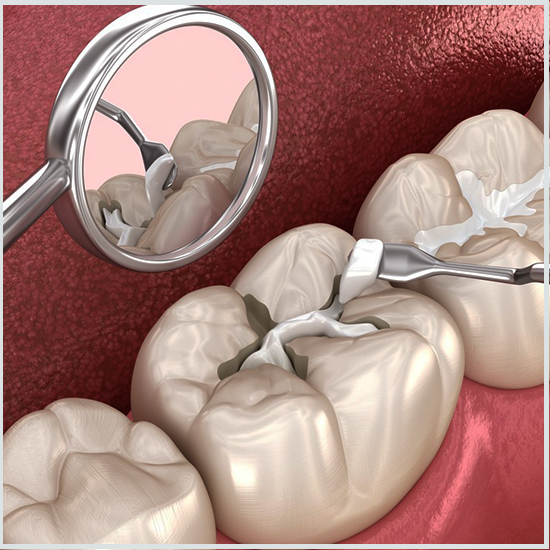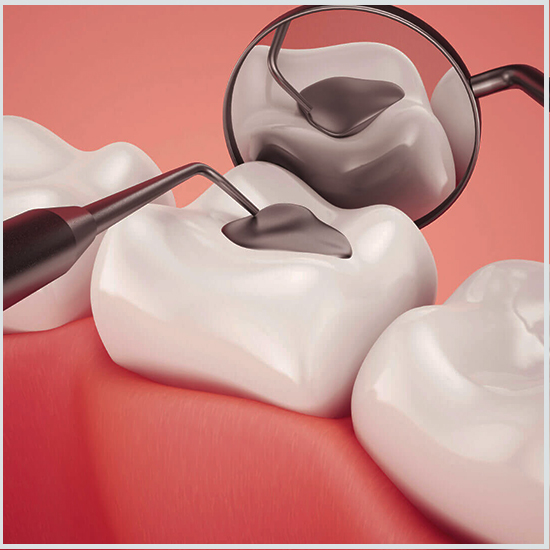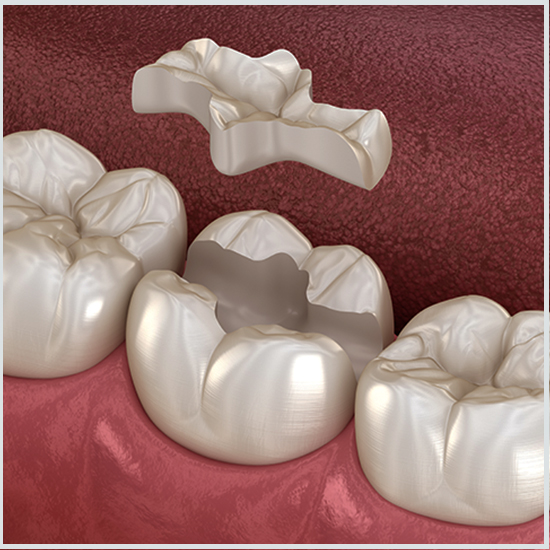Tooth Fillings in Turkey

In Turkey, dental tourism has gained significant traction due to its high-quality dental care at affordable prices. Among the various dental procedures sought by international patients, tooth fillings stand out as a common yet essential treatment.
This comprehensive guide aims to elucidate everything you need to know about tooth fillings in Turkey, encompassing the cost, procedure, and the overall treatment abroad.
Understanding Tooth Fillings
Tooth fillings, also known as dental fillings, are restorative materials used to repair minor to moderate tooth damage caused by decay or trauma. These fillings serve to restore the tooth’s structure, function, and aesthetics, preventing further decay and preserving oral health.
When it is necessary to fill a tooth?
Tooth fillings are necessary when tooth decay progresses beyond the early stages and affects the middle and deep layers of the tooth. The procedure involves removing affected tooth tissues and restoring the tooth using filling materials. Here are the indications and contraindications for tooth fillings, along with an overview of the types of fillings and the materials used:
Indications:
- Formation of a small or middle-sized carious cavity, with tooth decay degree being up to 50%.
- Restoration of the tooth’s aesthetic properties.
Contraindications:
- Destruction of over one-third of the tooth crown.
- Sub-gingival tooth decay or impossibility to isolate the cavity or the tooth itself from moisture.
- Bruxism.
- Excessive tooth attrition combined with direct occlusion.
Types of Tooth Fillings
In Turkey, dental clinics offer a range of filling materials, each with its unique advantages. These include:
- Composite Fillings: Made of a tooth-colored resin, composite fillings blend seamlessly with natural teeth, providing excellent aesthetics.
- Amalgam Fillings: Comprising a mixture of metals, including silver, mercury, tin, and copper, amalgam fillings offer durability and resistance to wear, making them ideal for load-bearing teeth.
- Ceramic Fillings: Crafted from porcelain or other ceramics, these fillings offer superior aesthetics and biocompatibility, making them suitable for visible teeth.
Materials Used for Permanent Tooth Fillings:
- Amalgam: Although its use is declining due to aesthetic concerns, amalgam fillings are durable and long-lasting.
- Cement-based Fillings: Includes mineral (phosphate) and polymeric (glass ionomer) cements, offering low adhesion properties and a short lifespan of up to two years.
- Porcelain Fillings (Inlays): Produced in dental laboratories, they mimic natural teeth shade and are resistant to staining.
- Composite Material: An excellent alternative to cement fillings, composites contain porcelain and come in various types:
- Acrylic composites: Strong but porous, increasing the risk of nerve inflammation and repetitive caries.
- Composites based on epoxy resins: More resistant to attrition but with insufficient strength properties and visible darkening over time.
- Light-cured composites: Highly durable with good aesthetic properties, serving for about 7-8 years. They harden under UV light and can be matched to the natural color of teeth.
Tooth fillings play a crucial role in halting the progression of cavities and restoring dental health. By understanding the indications, contraindications, types, and materials used for tooth fillings, patients can make informed decisions regarding their dental care. Consultation with a qualified dentist is essential to determine the most suitable filling option based on individual needs and preferences.

Take action today to achieve the smile you deserve. Prioritize your dental health now and unlock a brighter, more confident future
Cost of Tooth Fillings in Turkey
One of the primary reasons for choosing Turkey for dental treatment is the cost-effectiveness compared to many Western countries. The cost of tooth fillings in Turkey varies depending on factors such as the type of filling material, the complexity of the procedure, and the location of the dental clinic. On average, patients can expect to pay significantly lower prices for tooth fillings in Turkey compared to their home countries, making it an attractive option for those seeking quality dental care at affordable rates.
Benefits of Seeking Tooth Fillings in Turkey
- Affordability: Dental treatments in Turkey are considerably more affordable than in many Western countries, allowing patients to save significantly on treatment costs.
- High-Quality Care: Turkish dental clinics are renowned for their high standards of care, equipped with state-of-the-art facilities and experienced dental professionals.
- Tourism Opportunities: Patients can combine their dental treatment with a memorable vacation experience, exploring Turkey’s rich culture, history, and scenic attractions.

Procedure for Tooth Fillings
The tooth filling procedure involves several steps to ensure the effective restoration of the tooth’s structure and function. Here’s a detailed overview of how the procedure takes place:
- Preparation and Cavity Formation:
- The dentist drills out the decayed portion of the tooth to create a cavity suitable for filling material.
- Application of Metal Band (Matrix):
- A special metal band, known as a “matrix,” is applied around the tooth to restore its anatomical shape.
- Small wooden pegs may be placed between the band and adjacent teeth to facilitate filling material placement and preserve the tooth’s original shape.
- Outer Surface Preparation:
- The outer surface of the tooth is thoroughly prepared to prevent secondary tooth decay underneath the filling.
- Disinfection and Preparation of Tooth Cavity:
- The dentist treats the cavity with a special disinfectant gel to prepare it for filling material placement.
- The cavity is then washed and dried to ensure optimal conditions for filling material adhesion.
- Application of Adhesive Substance:
- A special adhesive substance is applied to the surface of the tooth cavity to enhance adhesion.
- Exposure to Sun Lamp (Polymerization):
- The treated cavity is exposed to a sun lamp or polymerizing blue-light lamp to harden the filling material and maximize adhesion to the tooth surface.
- Protection of Pulp (Dental Nerve):
- If the tooth’s soft tissues remain unaffected and endodontic treatment is not required, a special pad may be used to protect the pulp (dental nerve) from stimulation.
- Introduction of Filling Material:
- The filling material is introduced into the prepared cavity, ensuring thorough compression to prevent the formation of micropores.
- The dentist applies the filling material slowly and in small portions, exposing each portion to the sun lamp for efficient hardening.
- Creation of Anatomically Correct Filling:
- It is crucial to create an anatomically correct dental filling to restore the tooth’s initial occlusion and function.
- Polishing:
- Once the filling is installed, the dentist polishes the tooth to create a smooth surface, reducing the risk of plaque formation.
By following these meticulous steps, dentists ensure the successful placement of tooth fillings, restoring both the form and function of the affected tooth.

Conclusion
For individuals seeking quality dental care at competitive prices, tooth fillings in Turkey offer an excellent solution. With a range of filling options, expert dental professionals, and cost-effective treatment packages, Turkey emerges as a premier destination for dental tourism. Whether you require composite, amalgam, or ceramic fillings, rest assured that you’ll receive top-notch care and exceptional results in Turkey. Say goodbye to dental woes and hello to a brighter, healthier smile with tooth fillings in Turkey.
Frequently Asked Questions About Tooth Fillings in Turkey
How much do fillings cost in Turkey?
The cost of fillings in Turkey varies depending on factors such as the type of filling material used, the complexity of the procedure, and the location of the dental clinic. On average, prices for fillings in Turkey are significantly lower compared to many Western countries. However, specific costs can vary and are best discussed with a qualified dentist during a consultation.
Is it safe to get dental work in Turkey?
Yes, it is generally safe to get dental work in Turkey. Turkish dental clinics are known for their high standards of care, modern facilities, and experienced dental professionals. However, as with any medical procedure, it’s essential to research and choose a reputable clinic with certified dentists to ensure a safe and satisfactory experience.
How much is it to fix your teeth in Turkey?
The cost of fixing teeth in Turkey depends on the specific dental issues and the required treatments. Common dental procedures such as fillings, crowns, and root canals are typically more affordable in Turkey compared to many other countries. The exact cost can vary based on factors such as the complexity of the treatment and the materials used.
How long can a filled tooth last?
The longevity of a filled tooth depends on various factors, including the type of filling material used, the location of the filling, and the individual’s oral hygiene habits. Generally, tooth-colored composite fillings can last for several years, while materials like amalgam may last even longer. With proper care and regular dental check-ups, filled teeth can last for many years.
When is it too late to get a tooth filling?
It’s never too late to get a tooth filling if there is decay or damage that needs to be addressed. However, delaying treatment can lead to further decay, infection, and complications that may require more extensive dental procedures such as root canals or extractions. It’s best to consult with a dentist as soon as possible to address any dental concerns.
Do fillings damage teeth?
When performed by a skilled dentist using appropriate materials and techniques, fillings should not damage teeth. In fact, fillings are essential for restoring tooth structure and preventing further decay or damage. However, improper placement or poor-quality materials may contribute to issues such as sensitivity or recurrent decay. It’s essential to choose a qualified dentist and discuss any concerns before undergoing treatment.
Is it painful to get fillings?
The experience of getting fillings can vary from person to person. While some individuals may experience minor discomfort or sensitivity during the procedure, modern techniques such as local anesthesia help minimize pain and ensure a more comfortable experience. Most patients report little to no pain during the filling process.
Do teeth decay under fillings?
While fillings are designed to seal and protect teeth from further decay, it is still possible for decay to occur beneath a filling over time. This can happen if there is leakage or damage to the filling, allowing bacteria to infiltrate and cause new decay. Regular dental check-ups are essential to monitor the condition of fillings and detect any signs of decay early on.
Are tooth fillings worth it?
Yes, tooth fillings are generally considered worth it as they help restore tooth function, prevent further decay, and preserve oral health. By addressing cavities and damage early on, fillings can prevent the need for more extensive and costly dental procedures in the future. Additionally, fillings can improve the aesthetics of the smile and contribute to overall dental well-being.

Seize the opportunity today to attain the smile you deserve. Make your dental health a priority now and open the door to a brighter, more confident future.



